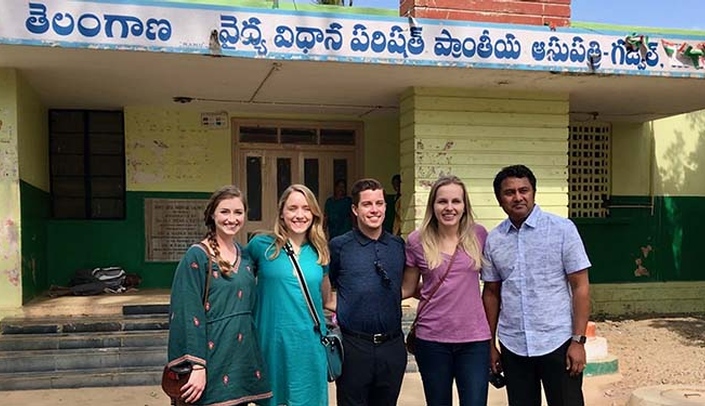Since 2009, UNMC has had an educational partnership with Osmania Medical College in Hyderabad, India, one of the leading medical schools in India.
Over the past nine years, more than 700 students from Andhra Pradesh and Telangana — two of India’s 29 states — came to UNMC for training opportunities. But, it was a one-way street. No medical student from UNMC traveled to India.
See a photo album from the trip.
Until this year. That’s when four fourth-year medical students made the trek to Hyderabad, a city of more than 8 million people located in southern India.
The recently graduated students — Drs. Ashley Janssen, Alyssa Malley, Jenny Shehan and Apollo Stack — had a memorable four-week experience.
They went to Basavatarakam Indo-American Cancer Hospital & Research Institute, one of the top cancer hospitals in India headed by Dr. T. Subramanyeshwar Rao, a surgical oncologist.
They saw firsthand the differences between India and the United States:
- How the volume of patients in India is so large that the doctor only can see each cancer patient for just a few minutes;
- How there are less screening opportunities in India, so 80 percent of cancer patients present in advanced stages;
- How surgical oncologists in the U.S. operate in the abdomen only, while surgical oncologists in India operate on the entire body except the brain and heart;
- How India health professionals start their day at 8:30 a.m. rather than 7 a.m. in the U.S., but go to dinner almost every night around 9 p.m.; and
- How there is a huge class disparity in India between the wealthy and the poor with many of the poor having limited access to health care.
For the most part, the UNMC students were taken under the wing of about 10 surgical oncology fellows.
“From day one, they welcomed us in. They were really nice,” said Dr. Malley, who will be doing her OB/GYN residency at the University of Hawaii. “It made me think — would we have done the same thing if the roles were reversed?
“It was a nice balance. We saw a lot of surgeries we hadn’t seen before. On our very last night, we went to dinner with all the surgical oncologists. It was really fun — laughing and sharing food.”
“It gave me a greater appreciation for the U.S. health care system,” said Dr. Stack, who will be doing his anesthesiology residency at UNMC. “India does remarkably well with limited resources. Their knowledge base and training are excellent.”
For Dr. Janssen, who is going to the University of Utah for her OB/GYN residency, it opened up a new world.
“Interacting on a day-to-day basis with them gave me a great appreciation for their culture and customs,” she said. “I really wanted to do more than just see the Taj Mahal. Now, I have a much greater appreciation for India.”
Dr. Shehan, who is doing her ENT residency at the Boston Medical Center, was impressed with India’s “family-centered culture” and the people’s “dedication and sense of duty.”
“I’ll now be able to better relate to patients that didn’t grow up in Nebraska.”
